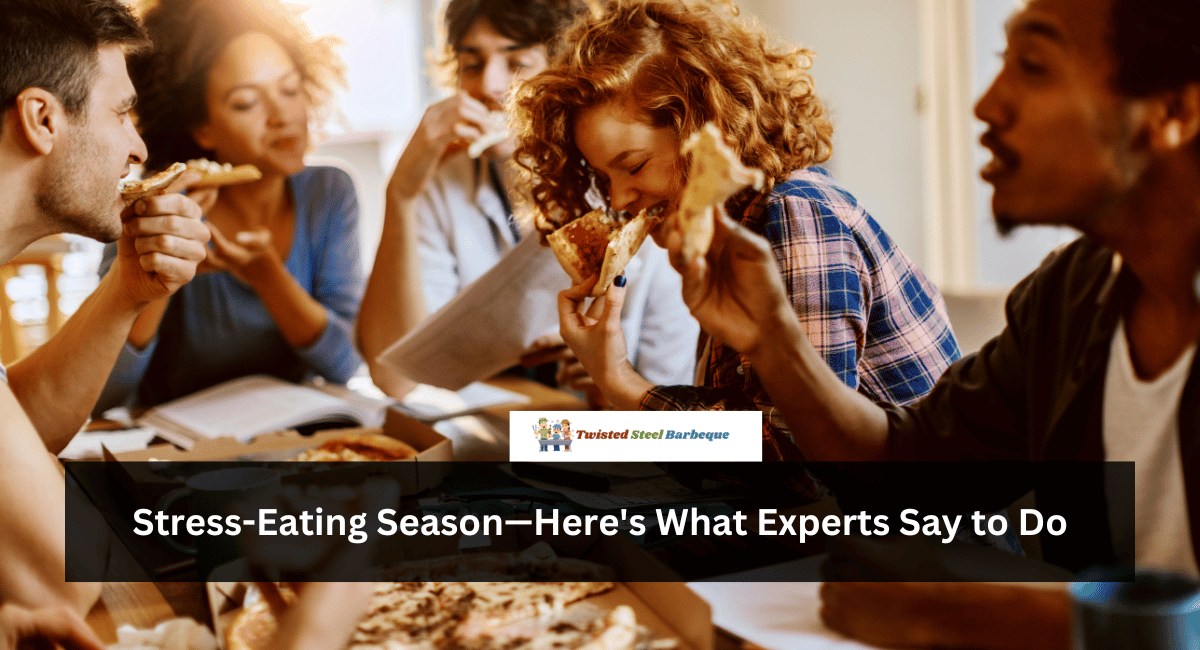As the year winds down, the holiday season comes alive with festivities, gatherings, and abundant food. Our calendars fill up quickly, from Halloween treats to Thanksgiving feasts, Hanukkah, Christmas, and New Year’s celebrations.
Add in the excitement of football season and tailgating, and it’s a recipe for indulgence. While these months bring joy and connection, they also usher in stress, making many of us prone to stress eating.
Understanding Stress Eating
Stress eating, or emotional eating, is when we turn to food as a coping mechanism for our emotions, particularly stress. Sarah Pelc Graca, a certified nutrition coach and personal trainer, explains that this type of eating often stems from seeking comfort, distraction, or relief from feelings of anxiety and sadness.
We are especially vulnerable to this behavior during the fall and winter months, with their unique triggers and traditions. But why do we reach for snacks when stress creeps in? Dr. Kari Anderson, an eating disorder therapist, explains that stress eating “works” because it provides temporary relief.
When we indulge in comfort foods, our bodies react in specific ways. Eating can lower cortisol, the stress hormone, and activate the vagus nerve, which connects our gut and brain. This process can enhance our mood and make us feel happier.
Moreover, indulging in certain foods releases dopamine, our brain’s feel-good chemical, reinforcing the desire to stress eat.
This cycle can become habitual; the more we engage in stress eating, the more we crave it. Dr. Anderson reassures us that if we feel stuck in this cycle, we are not alone—many people experience similar struggles.
Recognizing the Signs of Stress Eating
Understanding when you might be stress eating is crucial. Here are some common signs to watch for:
- Sudden cravings: Cravings for specific comfort foods that seem to appear out of nowhere.
- Emotional eating: Consuming food in response to feelings rather than hunger.
- Mindless munching: Eating while distracted, such as in front of the TV or scrolling through your phone.
- Eating without hunger: Indulging even when you’re not physically hungry.
- Using food as an escape: Turning to food as a reward or a way to cope with stress.
Dr. Anderson warns that stress eating can become problematic, especially if it leads to binging or purging. If you find yourself engaging in these behaviors, consider reaching out to a professional who specializes in eating disorders for support.
Strategies to Cope with Stress Eating
Coping with stress eating requires self-awareness and proactive strategies. Here are some expert recommendations to help manage this behavior during the holiday season:
1. Identify Your Triggers
Understanding your emotional triggers is key to breaking the cycle of stress eating. Before reaching for food, take a moment to ask yourself:
- Am I truly hungry, or is this emotional?
- Am I bored, anxious, or feeling pressured socially?
This reflection can help distinguish between physical hunger and emotional cravings.
2. Practice Mindful Eating
Mindfulness can transform your relationship with food. When you eat, try to eliminate distractions. Put down your phone, turn off the TV, and focus on enjoying each bite. Savoring your food can lead to greater satisfaction and help prevent overeating.
3. Find Healthy Stress Management Techniques
Instead of turning to food, explore healthier ways to manage stress. Consider incorporating practices such as:
- Deep breathing: Simple breathing exercises can help calm your mind and body.
- Meditation: Mindfulness meditation can reduce anxiety and improve overall well-being.
- Hobbies: Engaging in activities you enjoy can provide a much-needed distraction from stress.
4. Prioritize Sleep and Physical Activity
Adequate sleep and regular exercise play crucial roles in managing stress and cravings. Dr. Anderson emphasizes that getting enough rest and spending time outdoors can significantly improve your mood and decrease the likelihood of stress eating.
5. Choose Nutrient-Dense Foods
Incorporating lean proteins and whole plant foods into your diet can help curb cravings. These foods provide essential nutrients that keep you feeling full and satisfied. To nourish your body and mind, add fruits, vegetables, whole grains, and healthy fats to your meals.
6. Embrace Balance, Not Perfection
During the holidays, it’s important to enjoy traditional foods without guilt. Dr. Anderson advises against an all-or-nothing approach to eating. Instead, allow yourself to indulge mindfully. Sharing meals with loved ones and creating memories around food can be a beautiful part of overall health.
7. Build a Support Network
Reach out to friends or family members who understand your challenges with stress eating. Sharing your feelings can help alleviate some stress, and a supportive community can encourage healthier habits.
8. Consider Professional Support
If you find yourself struggling with emotional eating, don’t hesitate to seek professional help. Therapists specializing in eating disorders can provide valuable guidance and support, helping you navigate these challenges more effectively.
Conclusion
The holiday season, while joyous, can also be a time of heightened stress and emotional eating. By understanding the reasons behind stress eating and recognizing the signs, we can take proactive steps to manage this behavior. Strategies like identifying triggers, practicing mindfulness, and prioritizing self-care can significantly improve our relationship with food during this busy time.
Remember, it’s about balance and making memories, not perfection. Embrace the joy of the season while nourishing both your body and soul.
READ MORE: To Remember National Dessert Day, Here are 22 Delicious Offers.

